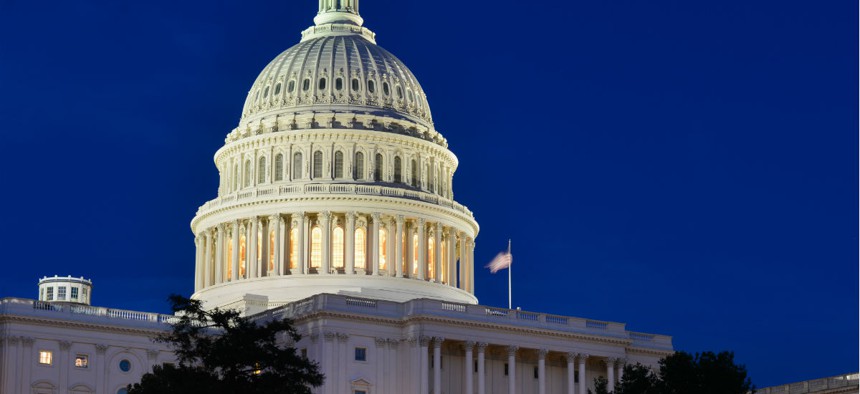Senate Sends Shutdown-Averting $1.3 Trillion Spending Bill to Trump's Desk
President Trump is expected to sign the massive funding measure into law.
The Senate early Friday morning passed 65-32 a $1.3 trillion funding package to set spending levels at every federal agency, sending the measure to President Trump for his signature.
The vote took a dramatic turn as several senators threatened to hold it up and risk a shutdown, but they ultimately abandoned their symbolic efforts. The bill allocates $63 billion more for domestic agencies than they would have received under previous spending caps thanks to a two-year budget deal President Trump signed into law earlier in the year. Agencies are operating under their fifth continuing resolution of fiscal 2018, which is set to expire Friday night.
Congress rushed the 2,232-page agreement through both chambers on an expedited schedule. Many lawmakers criticized secretive negotiations and the bill getting rammed through, but it ultimately cleared both chambers with ease. The House approved the measure Thursday afternoon.
The White House on Thursday said President Trump would sign the measure, while noting significant concessions included in the bill. The president himself said the bill contained Democratic “giveaways” that were required in order to “take care of military pay and increase new equipment.” Trump on Wednesday briefly considered withholding his support for the bill, but Republican congressional leaders were ultimately able to assuage his concerns.
“Is it perfect? No,” Office of Management and Budget Director Mick Mulvaney said at the White House Thursday. “Is it everything we asked for? No, we were never going to get that.” He noted Republicans had to make concessions to reach the 60-vote threshold in the Senate. He suggested the president be given line-item veto authority in the future.
A lot of people voted against the measure for various reasons, Mulvaney said, but "the president wants it to pass and wants it signed.”
In addition to setting funding levels, several high-profile provisions of the bill will implement key new policies on agency operations. The Homeland Security Department, for example, will be able to hire just 65 new customs enforcement agents. Trump had requested Immigration and Customs Enforcement hire 1,000 new agents in fiscal 2018 as part of his mandate that the agency hire 10,000 additional law enforcement personnel. The measure does include $1.6 billion for physical barrier construction along the U.S.-Mexico border, but prohibits a concrete wall in favor of secondary fencing and 33 miles of new barriers.
Some agencies, such as the departments of State and Agriculture, will face restrictions in implementing their planned reorganizations, including efforts to cut staffers.
Other provisions that held up negotiations in recent days and weeks included a shoring up of the federal background check system for firearm purchases, a tunnel project between New York and New Jersey, and easing the process for the Veterans Affairs Department to close facilities and pay for veterans to access private care. The gun issue was included in the bill and the Gateway tunnel project may receive future federal funding through compromise language, but the VA reforms were excluded after Democrats objected.
Due to the overall uptick in spending, nearly every agency will wind up with increases compared to their fiscal 2017 funding levels under the omnibus measure. Military personnel will receive a 2.4 percent pay raise, while members of Congress will once again see their pay frozen. Civilian federal employees have already received a 1.9 percent pay increase for 2018.








